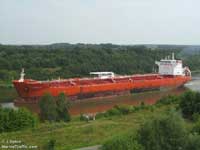
MATTHEOS I , Photo: J Dohrn, MarineTraffic.com
Earlier this week the 45,000 DWT tanker, Mattheos I, with a crew of 23, was hijacked off Benin in the Gulf of Guinea. According to the IMB Piracy Center, this year there have been 19 pirate attacks on ships in the Gulf of Guinea as compared to zero last year.
Armed Pirates Hijack a Fuel Tanker Off Benin and Take 23 Crew Members Hostage
While hijackings in the region still pale in comparison with the piracy scourge off Somalia, on the other side of the continent, the attacks have alarmed shippers and insurers. Last month, Lloyd’s Market Association, a group of insurers in London, added the coastal waters off Benin and part of Nigeria to a high-risk category that also includes Somalia’s coast.
Cyrus Mody, manager of the International Maritime Bureau, attributed the rise in piracy in the Gulf of Guinea to a crackdown on fuel thieves in Nigeria, a leading oil exporter. He said the effort had forced the thieves to move to neighboring Benin, whose government has little ability to police its coast. “We believe there’s a high probability of an extension of Nigerian pirates moving away from their own playground,” he said.
Although the hostages taken in these attacks have generally been released within 72 hours and none have been killed, Mr. Mody said the pirates were not gentle with captives. “These instances are very short, very fast and quite violent — rifle butts to the head, lashing with cables, that sort of violence,” he said.
Michael G. Frodl, the founder and head of C-LEVEL Maritime Risks, a Washington-based risks consultancy that advises maritime industry interests, said the rise in Gulf of Guinea piracy also reflected a general increase in economic misery, as well as the role model created by successful Somali pirate groups, who have been able to exact millions of dollars in ransoms from shippers.
In Somalia, Mr. Frodl said, pirates can act with far greater impunity because there is basically no government in that country.
“The one thing that’s going to hold back the development of a ransom model in Western Africa is the fact that these coastal countries still have law and order, and it’s going to be hard to hold on to a ship for more than a few days,” he said.
